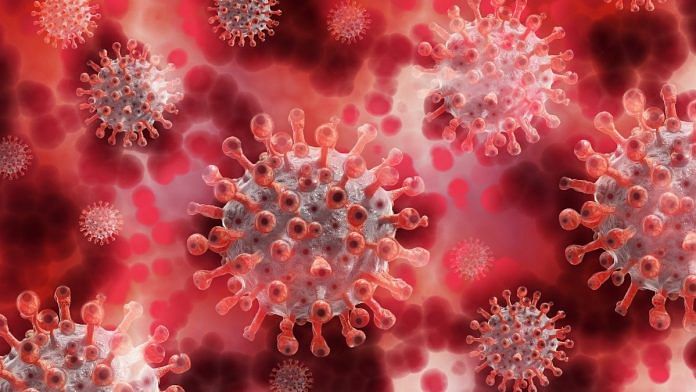New Delhi: The rapid spread of a new strain of the coronavirus in London and southeast England has prompted UK Prime Minister Boris Johnson to impose harsher restrictions during the festive season. Several neighbouring countries have since imposed ban on travel to and from the UK.
In episode 644 of ‘Cut The Clutter’, ThePrint’s Editor-in-Chief Shekhar Gupta explained the latest scientific developments on the new variant.
He also explained that though the new strain is unlikely to resist existing vaccines, it serves as a warning that Covid-19 is not like the measles and is prone to mutation.
Also read: What is the new coronavirus strain in UK and will vaccines work on it?
New Covid-19 strain could be more infectious
Gupta noted that viruses change all the time and the SARS-CoV-2 has gone through almost 4,000 identified mutations. However, all were redundant because they seemed immaterial to how the virus behaved.
Now, there are fears that the new strain in the UK is spreading much faster after almost two-thirds of the infections found in these areas were of the new strain. Earlier, from September to November, only half the new cases in the areas belonged to the new strain.
Similarly in South Africa, since mid-November, 90 per cent of cases have involved the new variant.
UK’s Health Minister Matt Hancock has said the new strain is 70 per cent more infectious. However, that figure is not based on lab-based evidence but rather modelling, which is a “dodgy” method, said Gupta.
More information is awaited from the Covid-19 Genomics UK (COG-UK) consortium and scientists are looking into whether super-spreader events and irresponsible human behaviour have played a role in the rapid spread of the new variant, he added.
Current data shows that one of the mutations on the spike protein of the virus, called N501Y, will help it attach more easily to human cells. Data also shows that another mutation is a H69/V70 deletion, where two amino acids in the spike protein are deleted, but this mutation has taken place in the virus several times before.
There is also still no evidence that the new strain can be more dangerous or resist existing vaccines, added Gupta.
Professor V. Ravi, retired head of the department of neurovirology at NIMHANS (National Institute of Mental Health and Neuro-Sciences), Bengaluru, pointed out that the mutation is a nucleotide change, which won’t change the disease biology or even diagnostics.
Also read: No need to panic, govt alert, says health minister amid concerns over new Covid strain
Virus unlikely to resist existing vaccines
If you think of a virus’ genome as a horoscope, a mutation is a way by which it is trying to rewrite its own fate, explained Gupta. “This is a perfectly natural process. This is survival of the fittest,” he added.
Previous mutations of Covid-19 include D614G, which emerged in Europe in February, and the Spanish-originated A222V that emerged in summer but they all behaved the same way, he explained. There was also a mutation in Denmark that led to the controversial culling of minks and one found in an immune-suppressed individual.
PM Johnson raised some alarm after he said based on modelling, the new strain could increase the R number — which is the measure of the infection rate of a virus — by 0.4.
Meanwhile, Professor Nick Loman, from the Covid-19 Genomics UK Consortium, has argued that it is more effective to keep to masks and other precautionary measures rather than wait weeks and months for laboratory experiments on the new variant to tell us whether we need to take action to limit the spread of the new strain, explained Gupta.
The fear now is that the new strain in the UK may have a strong effect on antibody susceptibility, said Gupta.
However, what’s “reassuring” is that top US scientists like Surgeon General Vice Admiral Jerome Adams and former Food and Drug Administration commissioner Scott Gottlieb have said the existing vaccines will work on the new variant. Also, Professor David Robertson, from the University of Glasgow, Scotland, has said the virus will probably be able to generate vaccine escape mutants but that is something that takes a very long time.
Watch the latest episode of CTC here:




Vaccine escape is an addition to our vocabulary. It means a virus mutating sufficiently to render a vaccine ineffective. Something like mosquitoes becoming resistant to DDT. The Turkish coinventors of the vaccine are expressing the hope that it will work against this new strain, say the vaccine can be modified in six weeks if required. Early in the pandemic, one recalls the hope that this was a creature of the winter, India’s high summer temperatures would cause it to wilt. Instead it seems to be settling at the crease for a long innings. WMD and a swift rollout of the vaccine remain our best hope.